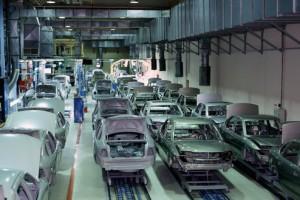 "The auto industry will change more in the next five years than it has in the last 50." James Bovenzi, Executive Director, North America GPSC at General Motors used this quote attributed to his CEO Mary Barra, during his presentation at the Automotive Logistics Global Conference in September. Bovenzi added, supply chains will be the enabler of the change.
"The auto industry will change more in the next five years than it has in the last 50." James Bovenzi, Executive Director, North America GPSC at General Motors used this quote attributed to his CEO Mary Barra, during his presentation at the Automotive Logistics Global Conference in September. Bovenzi added, supply chains will be the enabler of the change.
The automotive industry has seen exponential growth over the past decade. Global auto sales have hit record highs, and 2016 sales and production are estimated to increase for the seventh consecutive year. However, this growth has caused a major increase in the complexity of automotive supply chains.
It was made clear during the annual conference in Detroit that technology is the driving force of major changes in not just the supply chain, but also the auto industry as a whole. This includes connectivity, autonomous vehicles, ride sharing, and visibility tools such as location based services.
Mexico was also a key topic at the conference. With the majority of the biggest auto manufacturers and OEMs located or expanding operations in Mexico, this boom has caused a logistics logjam. Mexico has become Latin America's new base for vehicle assembly. However, from the availability of a skilled workforce to infrastructure challenges to not enough seaports, the infrastructure investments are not keeping up with demand.
According to an article in the Wall Street Journal earlier this year, Mexico's production boom has risen 50 percent since 2010 to 3.4 million units.
Terese-An Nguyen, Automotive Analyst at PwC, stated, "With 80 percent of the vehicles being built in Mexico tagged for export, building vehicles is one thing. Getting them out is another." Gene Sevilla, VP International Supply Chain Solutions at Ryder, spoke to the many challenges facing supply chains in Mexico, while also highlighting ways to overcome these complexities.
"Well managed supply chains are crucial to business success for manufacturers and OEMs," Sevilla said. "The growth has increased the demand for transportation, telecommunications, and customs processing."
Overcoming these challenges begins with better planning, big data analytics, visibility, and a focus on continuous improvement in the supply chain. As Sevilla mentioned, companies must have robust plans to handle more unexpected variations from their standard operations. Doing so will increase on-time pick up and deliveries, enabling companies to meet the increasing demands from customers.
One way to do this is by collaborating with a third-party provider that is experienced in the auto industry and has a strong portfolio of capabilities in Mexico.
In summarizing the major topics of the event, during his keynote presentation, Ryder Chairman & CEO, Robert E. Sanchez, stated how macro trends, as well as specific disruptors in transportation and logistics are making operating supply chains in the auto industry more challenging.
"Now more than ever it is important to take a new look at the way you are managing your operations," Sanchez said. "Outsourcing these functions to a third-party provider enables companies to be more responsive, expand markets, improve productivity, and cut costs."

